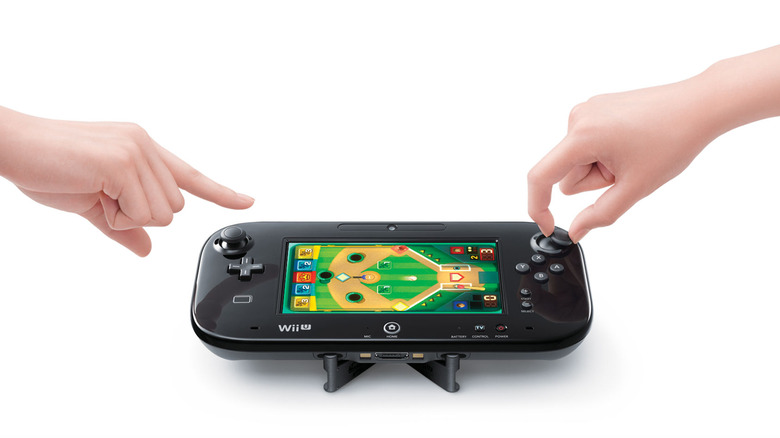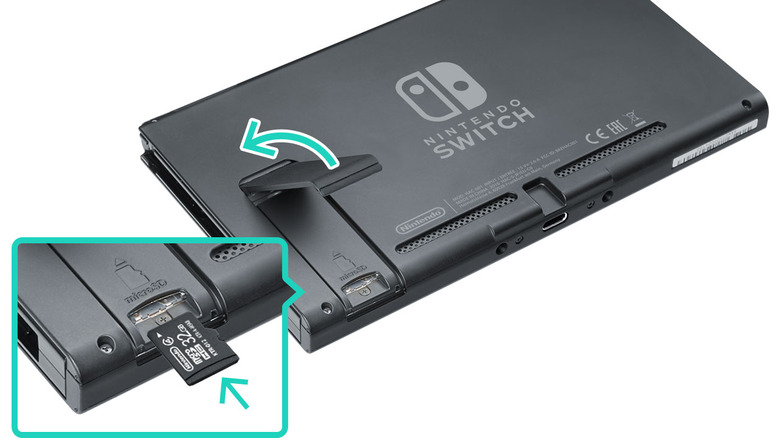The Dumbest Mistakes Gamers Make When Buying A Console
Purchasing a game console means spending a significant chunk of your hard-earned money on an entertainment device — one you'll likely have for the next several years. And whether you're a grizzled veteran gamer or someone jumping into gaming for the first time, choosing the right console can be difficult. You'll likely get input from friends, or you'll get your advice from a game-focused website. You may even get caught up in the marketing hype generated by a particular console maker.
When it comes down to it, you'll decide what draws you to a particular system. You'll ultimately take your own path toward identifying what suits you and what doesn't. We can't choose for you: we can, however, help you avoid the pitfalls of the selection process.
We've put together a list of the typical mistakes made by those shopping for a game console. As Eleanor Roosevelt once said, "Learn from the mistakes of others. You can't live long enough to make them all yourself." Other consumers have been in your shoes before, and have had to learn the hard way what not to do when selecting the platform they're going to play on.
Keep these mistakes in the back of your mind and you're sure to wind up with a system you're happy with.
Not being aware of where a console is in its lifespan
You've undoubtedly heard a story or two about Christmas gift decisions gone awry, where a well-meaning grandparent goes out to get the perfect present and leaves the store with a new game console. On Christmas, the wrapping paper is torn away, revealing underneath... a Wii U.
What's wrong with a Wii U, you ask? Well, if that Christmas gift was unwrapped on December 25, 2016, Nintendo was less than three months away from launching a brand new console (the Switch).
A new console launch essentially acts as a death knell for the one that came before it. Developer support begins to shift away from the previous system, and newer games are built to take advantage of the more recent hardware. Eventually, game releases for that older console wind down altogether.
It's important to know exactly where a console is in its lifespan when you're making your purchase. If a new system is just around the bend, you may be better off holding onto your money until the next-generation hardware is released.
Not waiting for reviews
Much like game reviews, console reviews can give you an inside and outside look at the hardware a company is releasing, and give you sense of the experience you'll get from owning that particular system. Most reviewers have not only played a lot of games, but they've played those games on a wide variety of platforms. So their expertise is pretty valuable when it comes to identifying the strengths and weaknesses of a game console.
One of the worst things you can do is plunk your money down before you read or watch reviews about the console you're interested in. It can be easy to get caught up in the excitement of a new product release, and the possibility of a system selling out can make you want to pre-order to avoid FOMO — fear of missing out. But you should at least know what a console is working with — and if it can do everything you want it to do — before you commit.
After all, you wouldn't buy a sports car if four-wheel drive and extra seats are important to you. The same goes for your console purchase. A review can help you decide if a particular system meets your needs before you spend a single dime on it.
Not considering the types of games you prefer
If there's one fact of life, it's that people have wildly varying tastes when it comes to the content they enjoy consuming. Some people prefer comedies over horror flicks, some choose rap music over country, and some would rather cozy up with a romance novel instead of a sci-fi thriller.
That same fact holds true when it comes to video games. Sure, first-person shooters are a fairly popular game genre, but there are gamers in the world who would be much happier playing a 3D platformer. And, as fate would have it there are certain game consoles that are stronger when it comes to addressing various genres than others.
Take a good, hard look at the console you're interested in to see if it offers a healthy selection of games in the genre you prefer. If you're a fan of shooters, for instance, you'll find the Xbox One and its flagship Halo series can scratch that itch. If you prefer more narrative-focused games, the PlayStation 4 offers titles like the Uncharted games and The Last of Us that go heavy on the story. And if family-friendly games are your cup of tea, you'll find plenty to like about the Switch, which plays host to Mario, Kirby, Yoshi, and more.
Buying based on promised, unreleased exclusives
In the game development world, nothing is ever set in stone. Games are delayed, reworked, and even canceled, which makes buying a console based on a promised-yet-unreleased game a risky endeavour.
Imagine, for example, if you'd purchased a Nintendo Wii U specifically for its exclusive Zelda title, which became Breath of the Wild. The game was delayed several times and did eventually see the light of day. Unfortunately, the Wii U version launched day and date with the Switch version, which meant those who'd held onto a Wii U for that game found themselves staring at a brand new Nintendo system by the time they got it.
Another example is The Last Guardian. Sony first started development on that game way back in 2007 — one year after the release of the PlayStation 3. The game was initially meant to release on that system, but delays in development and technical difficulties forced Sony to delay the game repeatedly. It didn't come out until 2016, and when it did, it released on the PlayStation 4.
If you'd purchased a PS3 for The Last Guardian, you would've wound up disappointed. Take unreleased exclusives — and the promise they'll release on the system they're targeting — with a grain of salt when making your console purchase.
Buying based on marketing deals
Marketing deals aren't a new thing in gaming. You can go back to the PS3/360 era to find deals between console makers and software companies, which usually include a game commercial with a particular system's logo coming at the tail end. But a shift seen in these deals more recently has introduced a new element: console-exclusive content.
When you're making the decision about which console to buy, it's a mistake to take marketing deals and console-exclusive content for a game into consideration. Why, you ask? Because these marketing deals are fickle beasts, loyal only to whoever is paying for them at the time. If you look toward the Call of Duty franchise, for example, you'll find that those games started the Xbox One/PS4 generation with an Xbox marketing deal, but years later, moved over to the PlayStation side of things.
Additionally, the console-exclusive content held back for one system may not be that good. Consider the Destiny series, which has had a PlayStation marketing deal since its inception. The PlayStation-exclusive weapons and strikes are considered by some in the game's community to be weaker pieces of content (save for Year 1 Hawkmoon), and because of how Destiny's activity and vendor systems work, exclusive strikes are never "Nightfall" strikes, and exclusive weapons are never sold by Xur (a being who sells exotic weapons).
Rather than get caught up in what's exclusive to what, it's better to ignore it entirely when it comes time to buy a new console.
Ignoring what your friends play on
When you're deciding on which console to buy, neglecting to take stock of what your friends play on is a mistake that will severely hamper your fun. Why? Because playing on different consoles means you probably won't be able to meet up and play online together. And if you and a friend enjoy swapping games back and forth, playing on two different platforms will prevent you from partaking in each other's collections.
Multiplayer gaming goes all the way back to the days of the arcade, where friends would gather around a machine and watch as two buddies mashed buttons in an attempt to one-up each other. Fast forward to modern times, though, and you'll find that a healthy amount of multiplayer action takes place online. And if you're someone who enjoys going head to head with a friend in a game of Madden, or enjoys teaming up to take on foes in Overwatch, buying the same console as your friend ensures you'll be able to play with or against them online.
Game sharing is also another reason to consider buying the same console as your friends. Video games are pretty pricey, with AAA titles usually coming in at $60. If you don't mind waiting until after a friend is finished, you can borrow their game and play through it yourself for free — but only if you both have the same console.
Forgetting accessory costs
Video game consoles are pretty expensive on their own, setting you back hundreds of dollars before you even get to thinking about games. Both those aren't the only costs you'll incur when you get set up for the first time. Unfortunately, buying a system itself doesn't always mean you'll get everything you need to have the best experience possible.
Take controllers, for example. Most console bundles sold today only come with one controller. But if you want to play with family or friends, you'll need to pick up another controller to facilitate that option. Controllers are regularly priced at $50 or above, so if couch co-op and versus modes are important to you, you need to budget for those extra gamepads.
And then there are accessories like external hard drives to consider. If you're someone who plans to install a lot of games, you'll find that the 500 GB — and even 1 TB — storage options provided by most modern consoles (like the Xbox One and PlayStation 4) can fill up rather quickly. And in the case of the Switch, a measly 32 GB of on-board storage means you'll likely need to spring for Micro SD cards to add more space.
If you aren't adding the costs of accessories into the total cost of your console purchase, you're going to be surprised by how much you have to spend when these add-ons become necessary.
Not considering the online services and their features
How important is online play to you? What about other related features, like voice chat and messaging? Failing to look at what each console offers in that arena is a mistake that could come back to bite you.
For instance, some consoles handle in-game voice chat differently than others. Both the Xbox One and PlayStation 4 support headsets that interact directly with the console, so you can either plug one into a controller or use a supported wireless option. The Nintendo Switch, however, uses your smartphone to handle the chat side of things while using audio from the Switch console for in-game sounds. If you're still using a Nokia flip phone from 2002, you won't be able to use voice chat in Switch games. Just something to keep in mind.
You should also look at the add-ons included with a console's online service. Both the Xbox One and PlayStation 4 have programs that offer free games every month to subscribers. These games can be accessed and played so long as you remain a subscriber to each respective online service, and can help supplement your library if you're just starting out on the platform. The Switch does not provide a similar perk yet, but has plans to add an online service later in 2018 that will offer free classic NES games to subscribers.
Look at what each online service offers and decide if it lines up with what you hope to get from your console. Not doing so could mean you end up with a system that falls short of your expectations.
Not factoring in your media needs
In more simple times, video game consoles only played video games. You'd insert a cartridge — perhaps after blowing on it a few times — and power your system on to start a game. When you were finished, you'd turn the system off. We obviously live in a different time, and video game consoles have evolved over the years into devices that do more than simply play game software. They're now home entertainment hubs themselves, featuring on-board Blu-Ray players, streaming TV apps, and more.
That's why it would be foolish not to look at the media options available for each console.
If streaming content is all you're interested in, you'll find most console options get the job done. Both the Xbox One and PlayStation 4 have a plethora of streaming apps available, and the PS4 goes so far as to offer an entire TV subscription service — PlayStation Vue — for those who don't want cable from giants like Comcast or Time Warner. The Nintendo Switch only has Hulu at the moment, but the presence of that app opens the door for more content providers to come about that platform in the future.
Disc-based content is another story. Both the Xbox One and PS4 have built-in Blu-Ray drives, with the Xbox One X variety of that platform supporting 4K Blu-Rays, but the Nintendo Switch is a home console/portable hybrid that uses flash storage cards instead of discs. So if you're a big movie buff with a huge Blu-Ray collection, you might find the Switch doesn't have you covered in the way the other consoles do.
Not accounting for the "extras" each console offers
Make sure to take a deep dive into the capabilities of each system to uncover their "extras": unique features that have no equal on competing platforms. Ignoring these extras could cause you to miss out on a feature you never knew you wanted but would love to have.
The Nintendo Switch stands out from the Xbox One and PS4 because of the simple fact that it can be either a home system or a portable. A game you're playing on your living room couch can be the same game you're playing on the subway with a Switch. And all you have to do to transform the system into a handheld device is remove it from its dock.
For its part, the PlayStation 4 features the ability to serve as an entry into the world of VR gaming. If you purchase a PlayStation VR headset, your PS4 turns into an engine that powers VR graphics for it, enabling you to play games from an entirely new perspective.
And the Xbox One has a useful "extra" that comes by way of its creator, Microsoft, also being the company behind the Windows PC operating system. When you purchase select Xbox One games digitally (those part of the "Play Anywhere" program), they also become playable on Windows at no additional cost. Several of these titles support multiplayer between the Xbox One and PC, and most titles support cross-save and shared achievements between the two platforms. And if you game on PC and buy games in the Microsoft Store, it's possible you could own some Xbox One titles already.






